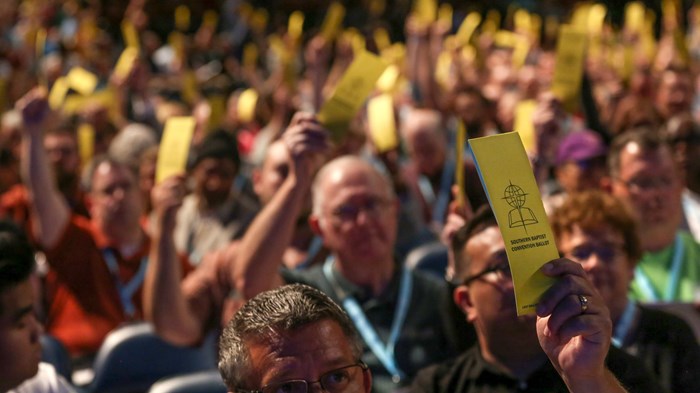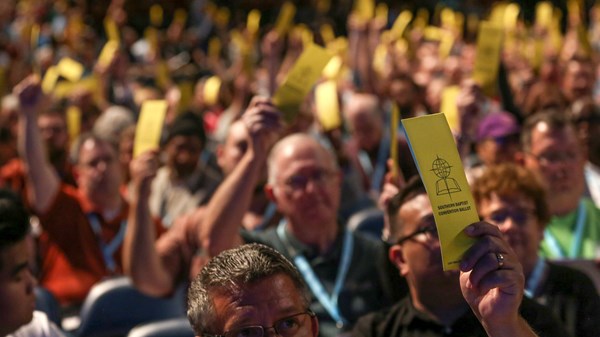

Southern Baptists approved a pair of proposals to strengthen their position against abuse—incremental changes to address the issue that has loomed large over the denomination and dominated conversation at this year’s annual meeting in Birmingham, Alabama.
The problem is a big one, embedded in a culture of neglect in their churches and institutions for years, Southern Baptist Convention (SBC) leaders acknowledged in a 52-page report released this week.
The most-anticipated business at its namesake gathering came on Tuesday evening, as 8,000 SBC messengers voted to add a bylaws line and new committee structure to deal with churches that mishandle abuse.
The denomination also passed a resolution to declare all sexual abuse “unquestionably sinful,” with top leaders offering harsh condemnation of inadequate responses and supporting legal efforts that allow churches and individuals to come forward with allegations.
Under its existing policy, the SBC can opt to cut ties with churches that show a disregard for victims of abuse, since caring for the abused comes up in its required statement of faith, the Baptist Faith and Message.
But faced with dozens of accounts of abusive pastors and cover-ups—most prominently reported by the Houston Chronicle this year—the nation’s largest Protestant body wanted to make that stance clearer and name abuse in its bylaws as grounds for being deemed “not in friendly cooperation” with the SBC.
The move passed by an overwhelming majority, yellow cards flashing across the arena, but will require another two-thirds majority vote in 2020 before the language is amended to require cooperating churches “not act in a manner inconsistent with the convention’s beliefs regarding sexual abuse.” (Another new addition would name racism as a violation that could cost a church its affiliation, as has happened in a couple of recent cases already. The SBC previously voted in favor of a line indicating affirming homosexuality as an example of a church violating the statement of faith and “deemed not to be in cooperation with the convention.”)
Delegates also voted to create a standing committee to evaluate churches that do not comply with denominational standards on abuse or other issues.
The nine-member body, a repurposed version of its credentials committee, will include the first-ever female registration secretary elected at an SBC meeting, Kathy Litton, who is a director at the North American Mission Board. In all, four of the committee members are women, though the messengers voted down a motion on Wednesday to replace one of the male pastors with Susan Codone, a Southern Baptist sexual abuse survivor whose story was included in the recent sexual abuse advisory group report.
The new committee “will help sustain and retain a vibrant and powerful witness,” said Ronnie Floyd, the new president of the SBC’s executive committee. “Its creation will be perfectly in keeping with our Baptist polity, which includes both our belief in the absolute autonomy of the local church and the right of our convention to define the terms of its fellowship with the churches it serves.”
The formation of this credentials committee follows clashes earlier this year over what the SBC should do about affiliates reported to have covered up abuse, hired perpetrators, or otherwise failed to protect their congregations. Member churches are—historically and proudly—autonomous and independent, so the convention isn’t set up with a top-down hierarchy to regulate them.
After the newspaper investigation in February, SBC president J. D. Greear called on a subgroup of the executive committee to look into a list of ten churches for possible violations of SBC standards, which would be grounds for dismissal. That subgroup dismissed concerns against seven of ten churches on the list, then its head resigned, saying they were not equipped to investigate the churches further.
The new credentials committee will review questions that come up during the annual meeting as well as when an issue challenging a congregation’s affiliation arises during the rest of the year.
During the convention, Greear and and Ethics and Religious Liberty Commission (ERLC) president Russell Moore spoke out against abuse as they presented the sexual abuse advisory group report to the messengers, who stood and prayed holding copies of the report.
Greear and Moore endorsed legal reforms to extend statutes of limitations for victims and to make it easier for churches to pass along information about former employees who were accused of abuse—a law on its way to being implemented in Texas thanks in part to efforts by SBC pastor Bart Barber, a member of the ERLC research institute.
“No church should have to face a question of whether they should share a credible allegation for fear of legal retaliation from an alleged predator,” Moore said.
Bible teacher Jen Wilkin teared up when asked about the impact of the report. “I started receiving texts from women who were following along who said, ‘This is what we prayed for,’” she said. “It has come at cost, but we’re thankful.” (Wilkin wrote for CT this month about addressing cases of abuse in the Bible and advocating for abused women in the church.)
While celebrated by SBC leaders, the moves come as a disappointment to dozens of activists involved with the For Such a Time as This Rally gathered outside the convention center on Tuesday, holding signs reading, “Be Like Jesus: Take Sexual Abuse Seriously” and “No Second Chances for Abusers.”
For years, they have called on the SBC to create a directory of known abusers. Greear mentioned the possibility of a database, which may be considered by the SBC sexual abuse study group in th efuture, but the denomination did not vote on or make plans around that recommendation during this year’s meeting.
Organizers including Christa Brown and Ashley Easter have challenged whether Southern Baptist efforts around this issue have been sufficient; prior to this year’s sexual abuse resolution, the SBC previously passed resolutions condemning abuse in 2007 and 2018.
“Southern Baptists, we have reached our age of accountability,” Moore told the messengers, “and the vital question before us today is what will we do next.”
This post will be updated Wednesday with more details from the annual meeting. This article has been corrected to indicate Kathy Litton is the first female registration secretary.

Support Our Work
Subscribe to CT for less than $4.25/month
















